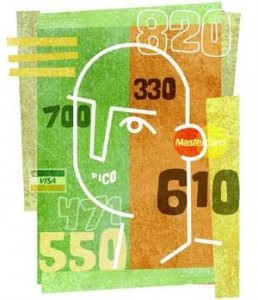 A January 2011, survey conducted by Opinion Research found more than 1,000 consumers do not know as much as they should about credit scores.
A January 2011, survey conducted by Opinion Research found more than 1,000 consumers do not know as much as they should about credit scores.
Twenty-two questions on the survey pertained to credit scores and out of those questions, consumers were correct only about 60% of the time.
Consumer Federation of America (CFA) and VantageScore Solutions released the survey findings in February of 2011 which revealed most consumers are unaware of recent changes in credit scoring. Lack of knowledge about credit scoring can cost you money.
Most consumers were unaware just how much a bad credit score can cost. Less than one-third of survey respondents answered correctly when asked how much more a person with a poor credit score would pay for a $20,000, 60-month auto loan than a person with a high score.
The answer may surprise some of you. It is an average $5,000 more in interest over the life of the loan for a consumer with the lower credit score. This is a good chunk of extra money paid for having bad credit.
Consumers who stay on top of their credit reports tend to be more knowledgeable about the credit scoring system. For example, according to the Consumer Federation of America and VantageScore Solutions, “survey respondents who had obtained their numbers scored 10 percentage points higher on the survey questions than those who had never obtained a credit score.”
Many consumers know the basics about credit scores but the scoring models can be confusing. Basically credit scores determine the odds a consumer will default on a loan and attach a 3-digit number to those odds. The credit score is based on information contained in a credit report.
Banks, lenders, credit card companies, employers, landlords, insurance companies and many more businesses consider a credit score when making a decision.
According to the survey, approximately 93% of consumers understand that a missed payment on a credit card or other obligation will lower your credit score.
About 85% know your credit score is used by lenders and credit card issuers to approve or deny credit and to determine the interest rate on a loan or credit card.
While the survey showed many consumers had some knowledge of key credit scoring subjects, there were some aspects of credit scores consumers did not know. A few survey results below showed:
- A credit score primarily represents the risk of not repaying a loan. Only 48% of consumers got this correct.
- 33% were knowledgeable that age is NOT a factor in determining credit scores but only 40% knew marital status is NOT a factor in calculating credit scores.
- 75% did NOT know who makes credit scores available as there are a growing number of generic and lender-specific credit scores in addition to the three main credit bureaus of Experian, Equifax and Transunion.
- 41% were knowledgeable that a good score depends on the scale used. A credit score over 700 for FICO is good and a credit score over 800 for VantageScore is good.
- 30% knew that borrowers with bad credit will pay $5,000 more in interest on a $20,000, 60-month car loan (as mentioned above).
Knowledge and comprehension along with paying bills on time is integral to having a good credit score. Spend a little time understanding credit scores and reviewing your credit report for errors and mistakes. Know where you stand by monitoring your credit score with Equifax ScoreWatch™. It can save you thousands of dollars.
















